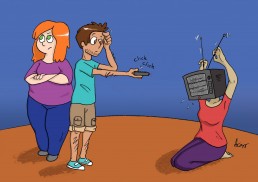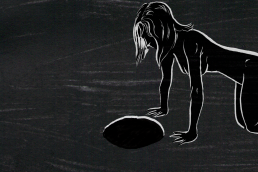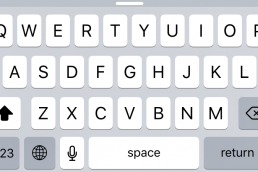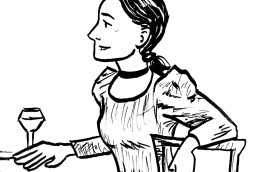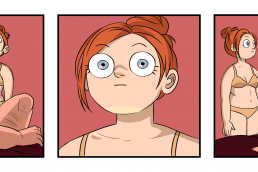by Meg Crane
Image credit: Annabelle Carr
There’s no doubt relationships are hard for people with anxiety. In a research paper titled Impairment and quality of life in individuals with generalised anxiety disorders, only 30.8 percent of anxious participants said they experience no limitations with friendships because of their mental health struggles. That means more than 2/3 people with anxiety disorders have some level of difficulty maintaining friendships.
This has certainly been my experience. My Generalised Anxiety Disorder has me feeling too ill to follow through with plans with friends and often too overwhelmed to respond to texts quickly. Sometimes I have difficulty focusing, which means I’m not always the best conversationalist.
I’ve lost friends because of how I treated them and I totally understand. In the past, I was a completely rotten friend. But I found a way to be an active, supportive member of my relationships without stepping over my own boundaries or ignoring my own needs.
1. Be open and honest
If people don’t know what’s going on, anxious friends can end up looking like jerks. I’m a high functioning anxious person and am often able to hide my mental health issues. For a long time, most people had no idea I had anxiety.
Part of hiding my health issues involved cancelling plans when I was feeling anxious or the symptoms of my anxiety – including nausea, headaches and difficulty breathing – were too great to hide. I had “the flu” a lot. So much, that friends started to believe I didn’t want to hang out with them.
One day, when I had to cancel plans, I decided to tell my friend the truth. Lying was just becoming too stressful. She stopped by with soup and made me tea, then sent me encouraging texts throughout the next week. Her understanding and kindness surprised me and encouraged me to tell more friends who, for the most part, had similar reactions. Being honest meant I no longer had to feel bad for lying and let my friends know my flakiness wasn’t something to be taken personally.
2. Communicate your needs
I became extremely open about my mental health struggles, even starting a blog where I explained what I was going through. As a result, I was flooded with messages from friends, family and complete strangers. Although they offered support and advice, it was overwhelming.
I’d reach for my phone in the morning to check the time and my heart would start racing because of how many notifications were waiting for me. I’d wait days to weeks to respond. I would frequently think about the people I wasn’t getting back to and feel guilt, followed by crushing anxiety and then a panic attack. This only got worse after a friend started giving me the cold shoulder, then told me off when I asked why. She was furious I didn’t text back quickly and only seldom joined her for dance classes and parties. I was a bad friend, so she consciously decided to be a bad friend back. Clearly, just communicating my feelings wasn’t enough; I needed to also tell people how my struggles translated into difficulties with relationships.
Around the same time, I published a blog post containing photos of my messy apartment, writing about how my anxiety-related joint pain and nausea had flared up so bad, I hadn’t been able to clean for weeks. A good friend called and chastised me for not asking for help before showing up with cleaning supplies.
“Promise me you’ll tell me what’s going on next time and ask for help so I don’t have to learn how bad you’re doing from your blog,” she said before leaving.
Although everyone knew I was struggling with anxiety, some friends still thought I was ignoring their messages because I didn’t like them. Others wanted to help and be there for me, and were offended when I didn’t reach out to them.
I started opening up on a new level, explaining what made me anxious and how people could help, including what to do if I had a panic attack. I opened discussions with friends about how we could communicate in a way that didn’t put pressure on me, but that also worked for them. This also allowed my friends to open up about how I could support them.
3. Put in extra
With my increased communication, I was getting so much support and help. It felt great, but I also developed a lot of guilt and insecurity. What if people came to resent me because I was so needy? Maybe people were thinking I was being selfish by accepting help and gifts. Was needing relationships to be structured a certain way self-centred and rude?
This wasn’t the case at all – and deep down I knew that – but to calm my nerves, I started putting extra work into the relationships that were most important to me, when I could. This included small gestures, like sending postcards that just said “I love you” and texts saying why I appreciated something, and larger ones, like taking a day off work to watch a friend’s kid to give her a rest. I did what I could to help, to show love and reciprocate my friends’ kindness, when I had the spoons.
It’s been a few years now since I realised I wasn’t being a fantastic friend and I’ve figured out how to do relationships with anxiety pretty darn well. I have a great group of supportive, loving friends who don’t mind my slow response time and appreciate the packages of chamomile tea I send out when I haven’t had the energy to put too much into the relationship.
If you’re worried you’ve been a bad friend because of your mental health, starting a conversation about how to make small changes that work for you and others could be a great step towards building strong, lasting relationships.
Meg Crane
Meg is a freelance writer and editor who focuses on mental health and relationships. She usually works with a cat on her lap and dog at her feet. Through her newsletter and blog, she helps creatives get their anxiety under control.

